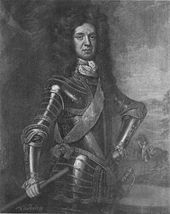Ferdinand Wilhelm (Württemberg-Neuenstadt)
Ferdinand Wilhelm (born September 12, 1659 in Neuenstadt am Kocher ; † June 7, 1701 in Sluis , Flanders) was Duke of Württemberg , who became known as a military leader in the cabinet wars of the late 17th century.
Life
Ferdinand Wilhelm was the sixth child of Duke Friedrich , who in 1649 founded the second branch line Württemberg-Neuenstadt and his wife Clara Augusta von Braunschweig-Wolfenbüttel . As a later son, he decided to pursue a military career. He gained his first experience in the Franco-Dutch War , where he served together with his older brother Friedrich August in a regiment from Braunschweig-Lüneburg . He then entered the service of Denmark in the Skåne War , where he was promoted to lieutenant general in 1682 .
When the Turkish army threatened Vienna in 1683 , Ferdinand Wilhelm joined the army under Duke Karl of Lorraine and fought in the Battle of the Kahlenberg , with which Vienna was horrified. Even after that he continued to fight in the Turkish war . In front of Neuhäusel fortress he was badly wounded in 1685 by a shot in the forehead. Ferdinand Wilhelm survived the injury thanks to his good constitution, but succumbed to its long-term effects 16 years later.
In 1688 he returned to the Danish service and received supreme command of the 7,000 men that Wilhelm III. were sent to help against the Catholic troops under James II . His younger brother Carl Rudolf also took part in this company. The two brothers fought together in the Battle of the Boyne and also contributed much to the subjugation of the island. William III. went so far as to say that next to God, the two brothers contributed most to the victory.
From 1692 Ferdinand Wilhelm, still in Danish service, was seconded to the defense of the Netherlands against the French in the War of the Palatinate Succession . The battles at Steenkerke on August 3, 1692 and Neerwinden on July 29, 1693 were lost, but Ferdinand Wilhelm distinguished himself to such an extent that he was appointed general of the Dutch infantry and colonel in the royal bodyguard . He had more success in the defense of Nieuwpoort in 1694 and in the conquest of Namur the following year. This war ended with the Peace of Rijswijk in 1697. Ferdinand Wilhelm was appointed governor of Sluis and all of Dutch Flanders .
In 1698 in the service of King August II of Poland, as Field Marshal General, he took over the supreme command of the Polish-Saxon troops in the Ukraine against the Turks , whom he forced to cede a piece of Podolia to Poland , and in 1700 he commanded Danish troops in the Holstein campaign against the Turks Sweden . Then he retired from military service.
A little later he suffered severe suffering, which was caused by the gunshot wound he had suffered near Neuhäusel. He died on June 7, 1701 in Sluis. He was unmarried and left no descendants. He was buried in the crypt of the House of Württemberg-Neuenstadt in the Neuenstadt-Nikolauskirche .
See also
literature
- Christoph Eberlein: Ferdinand Wilhelm. In: Sönke Lorenz , Dieter Mertens , Volker Press (eds.): Das Haus Württemberg. A biographical lexicon. Kohlhammer, Stuttgart 1997, ISBN 3-17-013605-4 , p. 225 f.
- Albert von Pfister : Ferdinand Wilhelm . In: Allgemeine Deutsche Biographie (ADB). Volume 6, Duncker & Humblot, Leipzig 1877, p. 710 f.
- Gerhard Raff : Hie good Wirtemberg all the way. Volume 3: The House of Württemberg from Duke Wilhelm Ludwig to Duke Friedrich Carl. Hohenheim, Stuttgart / Leipzig 2002, ISBN 3-89850-084-5 / ISBN 978-3-943066-11-1 , pp. 429-450.
- Harald Schukraft : A Brief History of the House of Württemberg. Silberburg , Tübingen 2006, ISBN 978-3-87407-725-5 .
- Robert Uhland: Ferdinand Wilhelm, Duke of Württemberg-Neuenstadt. In: New German Biography (NDB). Volume 5, Duncker & Humblot, Berlin 1961, ISBN 3-428-00186-9 , p. 95 f. ( Digitized version ).
Web links
- Ferdinand, 37 Ferdinand Wilhelm . In: Meyers Konversations-Lexikon . 4th edition. Volume 6, Verlag des Bibliographisches Institut, Leipzig / Vienna 1885–1892, p. 142.
- Ferdinand Wilhelm at LEO-BW
| personal data | |
|---|---|
| SURNAME | Ferdinand Wilhelm |
| BRIEF DESCRIPTION | Duke of Württemberg and Field Marshal General |
| DATE OF BIRTH | September 12, 1659 |
| PLACE OF BIRTH | Neuenstadt am Kocher |
| DATE OF DEATH | June 7, 1701 |
| Place of death | Sluis , Flanders |

